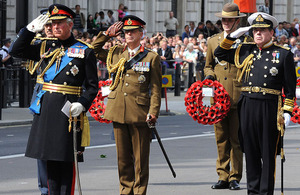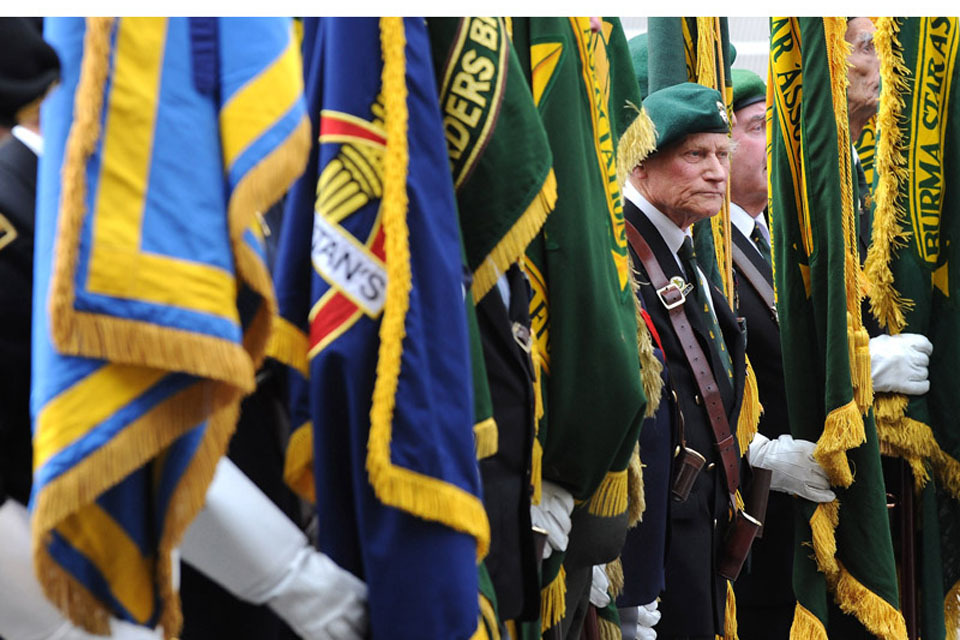65th anniversary of Victory over Japan Day
Services to commemorate the 65th anniversry of Victory over Japan (VJ) Day took place at the Cenotaph in London and at the National Memorial Arboretum on Sunday 15 August 2010.

His Royal Highness The Prince of Wales leads the commemorations to mark the 65th anniversary of VJ Day at the Cenotaph in London [Picture: Petty Officer Airman (Photographer) Mez Merrill, Crown Copyright/MOD 2010]
The services honoured the efforts of hundreds of thousands of servicemen operating in the harshest of conditions, and paid tribute to the nearly 30,000 British losses suffered during the Far East campaign, some 12,500 of whom died while prisoners of war.
Amongst those at the ceremony in London were Their Royal Highnesses The Prince of Wales and The Duchess of Cornwall, Prime Minister David Cameron, representatives of the three Armed Services, hundreds of veterans of the conflict, and members of World War Two associations.
Visitors to the National Memorial Arboretum included veterans from the Malayan Volunteers Group, the Far East Prisoners of War Association, and members of the Children and Families of Far East Prisoners of War charity who partly funded a memorial building at the Arboretum.
Prime Minister David Cameron, who laid a wreath in London on behalf of the Government, said:
We must never forget the sacrifices made and the dedication shown by those who served our country in the Second World War. They fought and suffered around the world in ferocious conditions. They witnessed incomprehensible horrors.
They lost their lives - and many were imprisoned. And they did all this for us - to protect the freedoms we all enjoy today.
VJ Day, the day the Second World War ended, is a time for this generation to reflect and show its gratitude to our veterans for their bravery, dedication and sacrifice.
The Second World War in Asia began on 7 December 1941 with the Japanese bombing of the US Pacific Fleet at Pearl Harbor, Hawaii, and simultaneous attacks on British, Dutch and American possessions in the Far East.
The Fourteenth Army, known as the ‘Forgotten Army’, was the largest British Empire and Commonwealth Army ever assembled, numbering over half-a-million men, and commanded by Lieutenant General Bill Slim.
700,000 Indians took part in the Burma Campaign between December 1941 and August 1945, 340,000 of them in the Fourteenth Army, and they outnumbered the forces from all other allied nations combined.
100,000 men from Britain fought in Burma, as did 119,000 soldiers from her East and West African colonies.
Chief of the General Staff, General Sir David Richards, whose father fought at Imphal, laid a wreath at the Cenotaph on behalf of the British Army. He said:

Royal British Legion and Burma Star standard bearers at the 65th anniversary of VJ Day commemorations in London [Picture: Petty Officer Airman (Photographer) Mez Merrill, Crown Copyright/MOD 2010]
“The Second World War in the Far East began with a series of defeats which rank among the grimmest memories of the British Army, and which caused many thousands of British and Commonwealth troops to suffer captivity in conditions we can scarcely comprehend.
But in 1944 one of the greatest of all British commanders, the much-loved Bill Slim, effected an extraordinary resurrection.
First at Imphal and Kohima, then in his 1945 drive back into Burma, he led Fourteenth Army’s British, Indian and African soldiers to a historic victory.
The achievement of Slim and his men, and the sacrifice of those who suffered and died for the allied cause in Asia, remains today one of the most honoured memories of the British Army.
The Japanese finally surrendered on 14 August 1945 following the dropping of the atomic bombs on Hiroshima and Nagasaki, and the Soviet declaration of war against Japan and the invasion of Manchuria.
The next day, Wednesday 15 August 1945, was celebrated as VJ Day - Japan formally surrendered on 2 September 1945 at a ceremony in Tokyo Bay aboard the USS Missouri.
Victory was total, but it came at a high price. Britain suffered 90,332 casualties in the war against Japan, of whom 29,968 died - 12,433 while prisoners of war.
For the veterans of the campaign, the services on Sunday were an opportunity to meet long-lost comrades and remember the thousands who did not make it back.
Mr John Nunneley MBE from Petersham, Surrey, fought in Burma against the Japanese following the Battles of Imphal and Kohima, and attended Sunday’s event in London.
He said:
On this 65th anniversary of Victory over Japan, survivors of that savage war, and the bereaved, pray for those who did not return.
To them, lying rank upon rank in eternal comradeship in distant war cemeteries, or lonely in an unmarked grave, we renew our pledge; at the going down of the sun, and in the morning, we will remember you.
The service at the Cenotaph was organised by the Ministry of Defence along with the Burma Star Association, which was founded in 1951 and brings together veterans from all three Services who experienced the bitter fighting in the jungles of Burma.